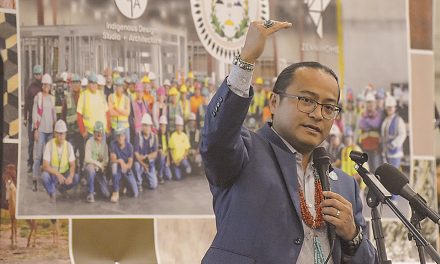
Letters: In-law who praises himself is highly suspicious
This letter is in response to the letter to the editor written by Leon Spencer, Burnham Chapter president (“Setting the record straight,” Sept. 16, 2021).
Mr. Spencer hails from Cornfields, Arizona, and is living in Burnham as an illegitimate in-law. My late father, born in 1900, used to play in jest “my in-law is better than your in-law” game with my brothers.
This game is rooted in tradition of trying to outdo one another of making exaggerated claims about an in-law through a clan member.
Ironically, in this modern age, I never thought an in-law, himself, would go out of his way to make exaggerated claims of accomplishments and take credit away from his deceased in-laws of Burnham Chapter.
Leon Spencer mentioned my name in his writing and said Rita Begaye was my half-sister. Rita’s family lineage is the same clan as mine and our great-grandmothers were sisters. I do address Rita as “sister” since we are of the same clan.
Leon Spencer is a disrespectful Burnham Chapter president in-law by alleging certain individuals are my half siblings and he is disrespectful to our deceased elders by spreading asinine allegations.
In-law Spencer has taken sole credit for the Veteran Center now sitting at Burnham Chapter House. Credit needs to go where it’s due. The plan for the center was started by a group of Burnham Chapter veterans who served during World War II, Korean Conflict, and Vietnam War. These veterans had many meetings with many prayers and had meetings with state officials.
Most of these veterans or family are now deceased, with the exception of one or two are: Wilbert John Begay, Johnny Charley (my brother and a World War II veteran), Albert Davis, Herbert Tsosie, Frank Bitsui, Frank Henry, Leonard Gleason, Max Bradley, Kellywood Begay, Joe Yazzie, Wilford Billy, Paul Anderson, Jack Bileen, Tony Bileen, Woodrow James, and Anderson Eldridge from Newcomb.
These men wanted the building to be hogan shaped and it was their dream building. The building became a reality in 2012. It’s a shame that most of these men never saw the veteran building, the building that they prayed for. I’m sure they never thought that one of their in-laws would take sole credit for the veteran building.
The veteran building with an attached costly pavilion now sits deteriorating as a storage building. It’s a sad sight to see. Meetings there are disallowed, not even under the big shade.
Another irrational claim made by our in-law Spencer is he is responsible for a fence that encloses the chapter boundary. This project, which started in 2007, took many years of work, many meetings, and working with the BIA Branch of Natural Resources.
Patty Redhorse-Chee, our late CLUPC president, deserves most of the credit because she tirelessly advocated for this District 13 fence project. Twenty-three miles of the fence line is completed, which is about one-third of the fencing project.
In-law Spencer also claims that he is building a bridge at a Burnham wash and it is 40% complete. There is no semblance of a bridge at that wash. I do know that in-law Spencer wanted to build a bridge himself at Hunter Wash using railroad ties.
Some concerns are: Who designed the bridge? Is there a scope of work and who will check the compaction and other engineering criteria? Is there an MOU or MOA with the entity that oversees the road? Is there a 404 permit in place under the Clean Water Act? Has NEPA provided their approval?
The chapter being involved places the Navajo Nation at risk if the bridge fails. A bridge is good provided that it meets all safety and engineering criteria and meets all rules and regulations.
Many of us thought our in-law Spencer would be an asset to our community so we voted for him in 2020, but we couldn’t have been more wrong.
Once Mr. Spencer became the chapter president, he came in wanting total control of CLUPC. We have two CLUPC membership vacancies. Mr. Spencer wanted letters of interest and wanted to interview and pick his own selections.
Two retired individuals, both master’s degree graduates, highly qualified with many years of supervisory and managerial experience applied. In-law Spencer also did not want me as the CLUPC president although I have a master’s degree as well.
Previously, CLUPC membership was selected differently. Most recently, one new member (secretary/treasurer’s sister) was not required by our in-law to provide a letter of interest and she was not interviewed, but Mr. Spencer recommended her approval by the chapter membership.
In-law Spencer claims full knowledge of laws and procedures and claims that others do not know meeting procedures. At the Sept. 14, 2021 teleconference meeting, Mr. Spencer showed just how knowledgeable he is.
The meeting was very chaotic and unstructured. I counted six points of order made on him by honorable Delegate Rickie Nez. A point of order is normally called when a meeting procedure is called into question.
The point of order involved questions on minutes that were taken long after the meeting was adjourned, how to proceed when someone wants to shift agenda items listed, properly adjourning a meeting pursuant to LGA T26, following the agenda, when to cease debate, announcing motioning parties, and was reminded on rules of order.
Mr. Spencer was also reminded that chapter members are very important. Mr. Spencer allows his supporters to make catcalls and snide remarks during the meetings. If he followed meeting procedures, then that would indicate he knows the law and can follow established meeting decorum. This is not the case though.
Leon Spencer falsely claims that of the four officials, which includes the grazing official, he is the only one who has done something, built a bridge, got a fence built, responsible for a veteran building, plus tons of other projects in other communities. Mr. Spencer says he reclaimed all abandoned mines on the Navajo Reservation. He does not give credit to all others involved in the many projects that he mentioned. Next, he might claim he can jump over tall buildings and catch a flying arrow.
An in-law who praises himself is highly suspicious. Concerning is his character, lack of respect, lack of the use of k’é to the other officials and the membership, and taking credit for the work of others.
These are not good qualities of a good leader nor a good in-law. Mr. Spencer has sent me a barrage of harassing emails previously and he always wants to put in the last word. I expect he will be sending another letter criticizing me and other constituents who elected him into office. He will then praise himself to no end, which is typically how he operates.
In the olden days, a disrespectful in-law would find their belongings and their saddle outside the hogan door. Unfortunately, the community has to put up with this disrespectful in-law in present age.
Fannie LookingGlass
Shiprock, N.M.
Taking credit where credit is not due
This rebuttal concerns Leon Spencer’s letter to the editor, “Setting the Record Straight,” published Sept. 16, 2021.
Do not be fooled, Tiis Tsoh Sikaad Chapter is in chaos, all due to questionable practices by the TTS officials and associates. They are Leon Spencer, Clara Pierce, Marlene Palmer, and Elizabeth Washburn, ASC Shiprock.
With added support, Mr. Spencer is causing havoc within the chapter organization from individuals called his inner circle.
Chapter president
The extensive list of projects claimed in his letter is quite shocking. If so, Window Rock should hire him to solve the people’s difficulties. The mentioned projects, for the record, were work done by predecessors. They did the proposals, assessments, land withdrawals, arch clearances, designs, and scope of work. Of course, he would take credit for these projects. Mr. Spencer’s modus operandi is taking credit where credit is not due.
Mr. Spencer falsely accused me of attacking the chapter. He claims I “failed to qualify for the chapter manager position…” His failure is informing the public that I qualified for the position. The archived personnel documents are confidential information within the TTS.
He knows unauthorized individuals cannot view those protected files. If Mr. Spencer viewed the documents, then he violated civil and Navajo Nation laws. His act of libel and viewing protected records could be cause for legal action to him, TTS Chapter and employees, ASC Shiprock, and the Navajo Nation.
Mr. Spencer mentioned my “failures in life…” What failures, pray tell? Obtained my master’s degree in finance and accounting in 1987, served and retired after 37 years after serving the Navajo people, a civil servant with Indian Health Service, have three children (all high school and college graduates and acquired their professions), and have five grandchildren (all high school and college graduates), except for the three-year-old. My family, friends and colleagues can attest to my proven achievements and accomplishments.
Mr. Spencer failed to mention his dual role as chapter president and veteran commander within the chapter organization. LGA-Title 26 notes this practice as conflict of interest. Mr. Spencer failed to disclose his financial compensation for occupying both positions, and this is noted as double dipping. A request for legal opinion was submitted to NNDOJ, the chapter is still awaiting answers.
Chapter secretary/treasurer
Undertaking during teleconference meetings on Google Meet have disrupted TTS and constituents. The forced muting and disconnections have caused havoc and dysfunction.
This was addressed, but Ms. Pierce assigned a key to manage the meetings, continues this practice. She insists that she maintains no key, but we wonder, who does? Next in line with a key is Ms. Palmer, the acting chapter manager.
Ms. Pierce records all conversations during and after official meetings. The constituents feel it is improper to record private interactions. A private conversation between Ms. Pierce and Ms. Palmer suggested that an investigation was imminent. The question is, who is investigating and who is being investigated? The higher-ups, NNDOJ, Ethic and Rules, Window Rock ASC, or Ms. Washburn, Shiprock ASC? It is an unknown.
Minutes range from two to five hours because it is read verbatim from Ms. Pierce’s recording. The length creates bickering between the inner circle and the constituents. Vulgarity eventually ensues causing Mr. Spencer to adjourn the meetings contrary to Robert’s Rule of Order.
Improper adjournments have occurred on several occasions. It should be decorum during the meeting to have participants identify themselves, but Ms. Pierce refuses to require the identity of those associates who make the vulgar comments. Minutes taken amount to street-type language and lacks professionalism.
Ms. Pierce’s stated minutes are fashioned by Ms. Washburne, Shiprock ASC. She stated meetings, according to Ms. Washburn, Shiprock ASC, shall be recorded and read verbatim.
TTS website and Facebook are perfect platforms for promoting hatred, and Ms. Pierce engages in it. She promotes disharmony on these mediums and she sets a framework for confrontations. This practice was reported.
Chapter manager
On Sept. 8, 2021, a constituent arrives at TTS to collect her PPE supplies. While having the supplies loaded, the constituent encounters Ms. Palmer. A conversation develops where Ms. Palmer insinuated that Mr. Spencer needs to collaborate with constituents and that she hates how he conducts TTS business.
Ms. Palmer said her mother, a non-English speaking elderly, disconnected from the meeting because it was too long and in English. This confirms the verbatim reading is consistent with the view that the meeting should be conducted earlier, or the minutes summarized.
The grazing official, after disconnection, redialed and rejoined the meeting disclosed he overheard Ms. Palmer and Ms. Pierce laughing. It was said Ms. Palmer hated certain constituents and she was fed up with those individuals because of their questions.
Ms. Palmer’s statements are major contributors to the division between the constituents, officials, and the administration. Her views are indicative that she has no respect for the constituents. Disciplinary actions have not stopped her conduct.
Elizabeth Washburn, ASC Shiprock
She may call it hearsay but Ms. Washburn, Shiprock ASC, is an obstacle. She has positioned herself in the middle of this obscene situation.
She schools negative information to Mr. Spencer, Ms. Pierce, and Ms. Palmer while simultaneously bolstering and cheering the constituents. Ms. Washburn once informed me during a meeting the chapters can make their own laws. Where does this happen?
She believes that the certified chapters can operate in ways that will circumvent the LGA-Title 26 and the 5 Management System P&P.
These statements create discourse between the TTS and constituents. She espouses the belief the Robert’s Rule of Order has no place in chapter meetings. The admonishment received by Mr. Spencer from honorable Delegate Rickie Nez only affirms the Robert’s Rule of Order is required at our chapter meetings.
Inner circle
Spouse, in-laws, immediate family of chapter officials, and veterans through recruitment, added membership into the inner circle. The disruption caused during the meeting of Sept. 10, 2021, emanated from individuals in this group. The rhetoric of obscenities caused Mr. Spencer to adjourn the meeting abruptly and improperly again. It is believed that Mr. Spencer, through this planned maneuver of chaos, sets up all future meetings in his favor.
Mr. Leon Spencer preaches disorder and absolute control in the operation of TTS. His claims to have completed unlimited projects for TTS are, at best, fabrications.
His associates foster negative attitudes, dislikes, and hatred toward chapter constituents. The unhealthy interference of ASC Shiprock has pitted TTS officials against constituents.
The involvement of the inner circle sanctions degrading remarks towards the constituents. In a nutshell, this is the operation of Leon Spencer, chapter president of TTS.
Charles D. Benally
Tiis Tsoh Sikaad Chapter
Moncisco Mesa, N.M.
Commission is highest of high-maintenance bodies
Having spent over five years with the Office of Navajo Government Development, 14 months as a policy analyst, and four years as an executive director, I’m confident I can sufficiently assess the Commission on Navajo Government Development that the Navajo people should know.
To put it bluntly, the 12-member commission is bloated to the extent that the administration spends more than a third of its time on their nomination and confirmation process from their respective entities to the Navajo Nation Council, including the intermediary corridor of the Naabik’íyáti Committee.
The commission has a mixture of two-year terms and some with four-year terms. Upon their confirmation, the administration goes through an orientation with them and they are handed a three-inch binder filled with Navajo government-related information, beginning with the Navajo Nation Council Resolution CD- 68-89 (Dec. 15, 1989), reforming the legislative and executive branches and including Navajo Nation Supreme Court cases, Navajo Nation Attorney General’s opinions, Navajo Nation codes, and more than 30 years of Navajo Nation Council historical legislations.
The newly seated commissioners are charged to thoroughly examine these materials along with their plan of operation in the Navajo Nation Code.
I seriously doubt any of this material ever sees daylight, left unread, or shelved, or perhaps tossed in a closest. This is to say nothing of the multiple “work sessions” they demand for the very information they’ve been provided. In many cases, these work sessions involve Navajo Nation staff from other divisions and programs, which is a resource strain on time and capital. The commission regularly requires a high level of attention and with temperamental demands.
In my best estimation, this commission takes the trophy for being the highest of high-maintenance body in Navajo Nation government.
With the incessant turnover of commissioners coupled with unending orientations and work sessions, the very notion of any meaningful “government reform” recommendation takes a backseat.
Each commission member makes government reform the least of their priority; I noted this because each commissioner holds an 8-to-5 day job, secondarily in some cases they are chapter officials or affiliate with other commissions or boards and, in a couple of separate examples, two are full-time Navajo Nation employee and two are full-time college students.
When it comes to any genuine “government reform” initiatives, the least of their knowledge and time is on Navajo government reform.
From an administration perspective, the monthly task of spoon-feeding basic Navajo government knowledge to commissioners becomes a phenomenon of pushes and pulls. With commissioners coming and going, I’ve observed the task of government reform pushed, pulled, started, stopped, and collided with other agendas and how it changed position and speed. Quite frankly, this is an unending cycle of going nowhere in a hurry.
There exists a toxic culture of a conflict of interest by a commission member in a leadership role and an administration staff that plagues both the office and commission business.
Imagine a husband and wife who live in the same household, one serves on the Commission on Navajo Government Development while the spouse is a staff member in the Office of Navajo Government Development. This has existed for more than two years where you have two same-sex male couple living in the same household affiliated with both the commission and office.
Now imagine the impossible difficulty for any director to manage such an office or guide the commission.
There are enablers who turn a blind-eye to such Navajo Nation Standard of Conduct and Restricted Activities of Public Officials and Employees, e.g., fellow commissioners, staff members, council Delegates, Office of the Speaker, and the Office of Legislative Counsel.
This is a perfect example of a morass in government that the Navajo Nation Ethics in Government Law seemingly is a joke (to say nothing of the Navajo Nation Personnel Policies and Procedures Manual). In such a twisted quagmire, no information from an executive session is confidential and no personnel information such an employee’s performance evaluation is confidential.
Another example of a toxic culture cultivating over time is micromanagement by elected officials, i.e., commissioners. The propensity for micromanagement typically comes from those who are Navajo Nation employees or former employees that serve on the commission.
I’m a stern believer that micromanagement is one of the worst, most damaging and morale-sapping ways of managing people, which seriously affects productivity, employee retention and ultimately damage people’s health.
A director or manager’s job is to provide guidance and support while facilitating a positive working environment where employees can perform at their best. Micromanagers achieve the total opposite. As a result, the commission has recently turned its attention to personnel matters, in part to keep its toxic conflict concealed, rather than espousing visionary government reform measures and while suppressing plans for the construction of a restoratives hogan and sustainability initiatives.
There also exists a subtle conflict of interest by the five agency representatives to the commission. Each of these officials are rooted in chapter government as chapter officers, land, or grazing members. These five commissioners are perhaps in the worse paradoxical position when they are charged with the task of Navajo Nation chapter government reform.
They are tasked with restructuring the very (chapter) house they are elected to govern for their community constituents; they are truly “conflicted,” a former outspoken 23rd Navajo Nation Council delegate used to profess.
There are occasions when a chapter government meeting and commission meeting occur on the same day for some and in such occurrences, an agency representative is certain to skip-out on their low priority commission meeting.
A former commissioner was outright honest with me regarding this by stating, “I take $500 over $100 in stipend.” A chapter meeting or planning meeting pays $500 in stipend while a commission meeting was $100, now $250 since December 2020.
The commission membership is half that of the Navajo Nation Council since the passage of the 2009 initiative petition that reduced the Council, a 12-member commission to that of 24-member Navajo Nation Council. The commission is the only Navajo governmental entity that is half the size of the Council, all other commissions, boards and advisory council are much more leaner and efficient.
The solution to this over-bloated and inefficient entity is to reduce them from 12 members to perhaps five or seven members. To achieve this will require an initiative petition or a referendum (initiated by a lawmaker) to put the measure on the Navajo Nation-wide election in 2022.
Any meaningful Navajo Nation “government reform” must first begin with a self-reflection by the commission and the Naabik’íyáti Committee as an oversight, a deliberate and focused attention on a whole host of other issues not mentioned here.
The commission has managed to create its own monsters as in the Navajo mythology twin-Monster Slayer narrative – great giants of hidden conflicts, gods of backbiting and self-serving agenda and blatant lies, giant rolling stones of micromanagement and recent illegal meetings and actions among other vices.
These are the metaphorical invincible monsters that people create for themselves. People manifest their own monsters, they create their own barriers and blocks and set themselves up to be captives of their own minds, so that becomes the invincible monster.
In the era of sustainable and innovative solution-oriented world of the 21st Century, the potbellied and sluggish commission must be reformed.
Edward Dee
Teec Nos Pos, Ariz.








 Highway 264,
Highway 264, I-40, WB @ Winslow
I-40, WB @ Winslow